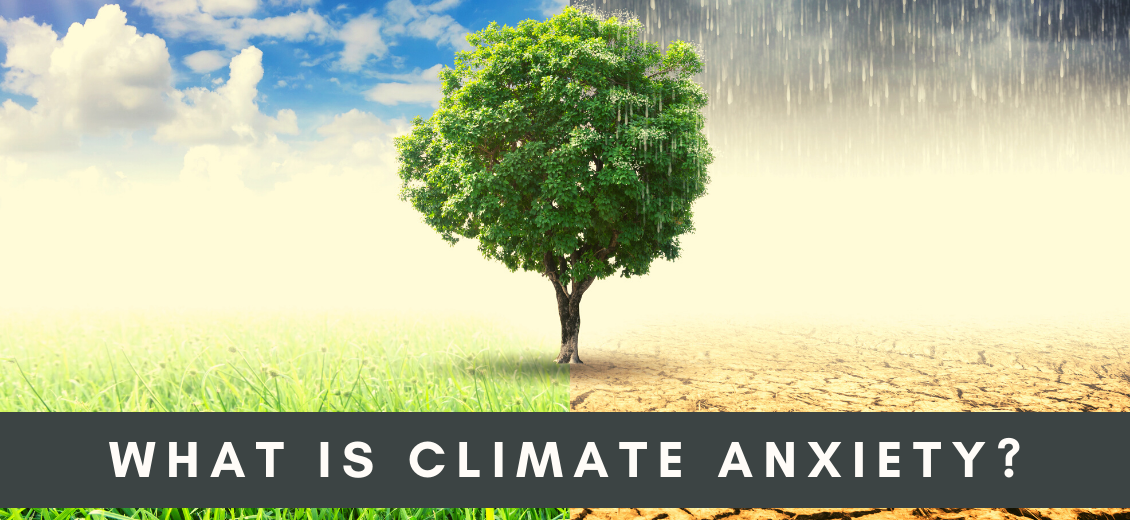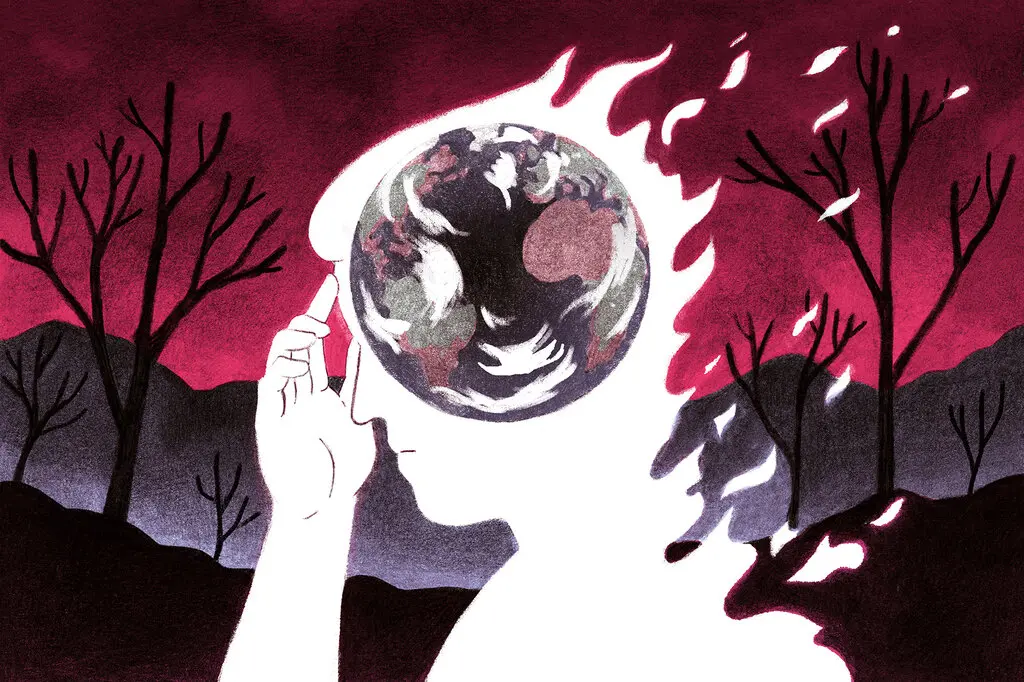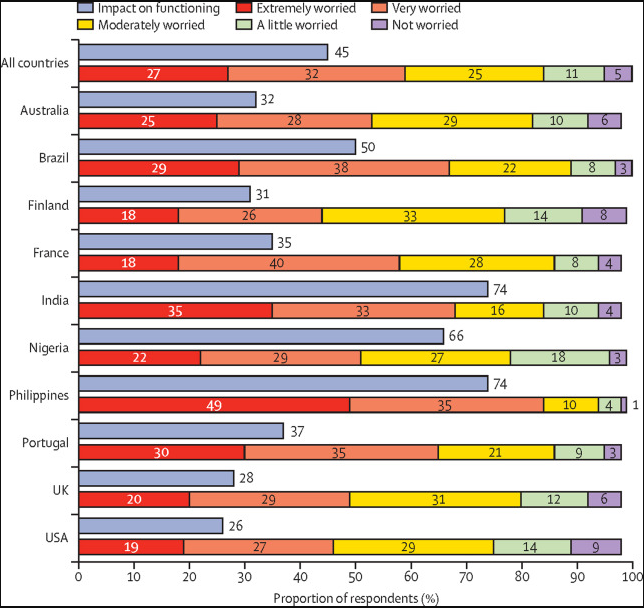What is Climate Anxiety?
Blogs Home
- 03 Feb 2022

Climate change and global warming are often dismissed as problems for the future - problems that we have time to tackle. However, for the Gen-Z and the younger millennials, the rapid environmental changes are all they have known. Heatwaves, droughts, smog, floods and storms are taking over the 21st century and no proper action seems to have been taken.
What is climate change?
Climate change is one of the most dangerous threats to the planet. If it isn’t tackled or controlled, life on earth will cease to exist.
According to the United Nations, “Climate change refers to long-term shifts in temperatures and weather patterns. These shifts may be natural, such as through variations in the solar cycle. But since the 1800s, human activities have been the main driver of climate change, primarily due to burning fossil fuels like coal, oil and gas.”
As a result of climate change, the earth is 1.1°C warmer than it was in the late 1800s. The last decade (2011-2020) is the warmest decade on record.
Climate change is usually associated with warmer temperatures but today, the consequences include severe sudden droughts, increasing floods, water scarcity, long droughts, melting polar caps, decline in biodiversity and catastrophic storms. Climate change doesn’t just affect one part of earth, it affects every form of life there is.
How does climate change affect people?
All the irreversible climatic changes are inter-connected to human life. The melting of polar ice will lead to rising sea levels which will in-turn, force people living near the shores and on small islands, to relocate. It will also cause saltwater intrusion into freshwater lakes and rivers and lead to long droughts that will cause famines.
The warmer the summers, the colder the winters. Today, even the cities near shores are being subjected to colder nights and warmer days. This is due to the intensive pollution and greenhouse gases in the air. Increased carbon monoxide, carbon dioxide and other harmful gases are found in excessive abundance, right now.
The psychological effect caused by climate change is called climate anxiety.
What is climate anxiety?
Climate anxiety (or eco-anxiety) is the worry, frustration, grief and anger linked to the reality of the on-going climate crisis and the government’s failure to respond to it accurately.
It is also called ‘climate change crisis’, ‘eco-angst’, ‘eco-trauma’ and ‘ecological grief’.
People around the world are feeling betrayed by leaders and feelings of anxiousness are rising due to uncertainty of the climate crisis. Eco-anxiety is but a healthy response, as it points out that the individual is aware of the upcoming disasters surrounding the environment.
The University of Bath in the United Kingdom conducted the biggest scientific study on climate anxiety till date - covering over 10,000 people aged between 16 to 25, in 10 different countries. The data wasn’t just linked to the intensity of climate anxiety felt among the people but also to the governments that are seen lacking in taking meaningful and decisive steps to tackle climate anxiety.
Here is what the study found:
- Almost half of the youth taking part in this survey (45%) say that climate anxiety is affecting their daily lives in various ways.
- More than 7 in 10 people (75%) say that the “future is frightening”.
- Around 58% said that the governments were “betraying me and/or future generations” whereas 64% said that the governments are not doing enough to avoid the upcoming climate catastrophe.
- Almost 4 in 10 teemagers (39%) said they are hesitant about having kids due to climate related fears.
“These responses are completely understandable,” says Elizabeth Marks, a clinical psychologist and lecturer at the University of Bath who co-authored the study. “We feel sadness and grief when we lose things, and we've already lost things because of climate change. We feel fear and anxiety when we're under threat, and there isn't a clear way to avoid or stop what's happening with climate change. That's what climate anxiety looks like.”
Climate anxiety isn’t something you can just get over with. You need to learn to live with it and find your triggers. Just remember that your feelings are understandable and valid, and that the problem is real.
Is climate anxiety normal?
Anxiety stems from your body responding to perceived threats of fight-flight-freeze responses. However, climate change is real and this anxiety pushes us to find solutions for the upcoming doom which seems to be approaching at a rapid rate. Climate anxiety is therefore a motivator for survival that pushes us to find solutions for a problem we, ourselves, have created.
What does climate anxiety feel like?
One of the main reasons for this deep-rooted anxiety stems from the knowledge that permanent changes are occurring to our environment and that big harm is being done to the various species of lifeforms living on the planet. It could also stem from a feeling of hopelessness against the planet’s environmental changes.
“It can be denial at first, and then you may have some fear and anger and then sadness.” said Phoenix Smith, an eco-therapist.
A few of the symptoms include:
- Anger or frustration, particularly toward people who don’t acknowledge climate change or towards older generations for not making more progress
- A fatalistic thinking
- An existential dread
- A guilt or shame related to your own carbon footprint, however big or small
- Post-traumatic stress after experiencing effects of climate change
- Feelings of depression, anxiety, or panic
- Grief and sadness over the loss of natural environments or wildlife populations
- Obsessive thoughts about the climate
These issues can cause problems like sleep deprivation, appetite changes and difficulty in concentrating. It can also cause stress that might strain relationships with people who have different views on climate change.
It can also lead to throwing yourself into distractions to temporarily feel reprieve. However, it is a less-than-ideal reaction to climate anxiety.
What can you do to battle climate anxiety?
- Spend time around nature.
- Know that it isn’t all in your head.
- Join support groups that talk about the climate crisis.
- Do whatever you can do stay grounded and happy.
- Adopt “greener” and more sustainable practises.
- Don’t deny the issue, accept it.
- Join NGOs and initiatives that battle climate change,
- Therapy is always a great option.
Further research and more diverse methodologies are needed to fully understand the extent of climate anxiety, mainly on the groups that it affects the most - indigenous people, teenagers and children.
Climate crisis is reversible if correct action is taken. Individual steps matter, for each one of us together make up the world. It is therefore a good idea to do what you can to save our planet and the people on it by converting to a more sustainable lifestyle.
Jess Doshi
Sources:
Climate anxiety? The whole world is feeling it. (n.d.). Avaaz. Retrieved January 18, 2022, from
Eco-anxiety: Symptoms, Causes, and How to Cope. (2020, September 23). Healthline.
https://www.healthline.com/health/eco-anxiety
The climate crisis and the rise of eco-anxiety. (2021, October 6). The BMJ.
https://blogs.bmj.com/bmj/2021/10/06/the-climate-crisis-and-the-rise-of-eco-anxiety/
What is Eco-Anxiety? (2022, January 9). News-Medical.net.
https://www.news-medical.net/health/What-is-Eco-Anxiety.aspx
The Rise of Climate Anxiety. (n.d.). Discover Magazine. Retrieved January 18, 2022, from
https://www.discovermagazine.com/mind/the-rise-of-climate-anxiety
Duggan, J., Haddaway, N. R., & Badullovich, N. (n.d.). Climate anxiety is real. Why talking about it matters. The Conversation. Retrieved January 18, 2022, from
https://theconversation.com/climate-anxiety-is-real-why-talking-about-it-matters-172813
Forum, W. E. (2022, January 14). Climate change: Inadequate governmental response is causing climate anxiety in young people. The European Sting - Critical News & Insights on European Politics, Economy, Foreign Affairs, Business & Technology - Europeansting.com.
Merino, D., & Ware, G. (n.d.). Ten years to 1.5°C: how climate anxiety is affecting young people around the world – podcast. The Conversation. Retrieved January 18, 2022, from
Wu, J., Snell, G., & Samji, H. (2020). Climate anxiety in young people: a call to action. The Lancet Planetary Health, 4(10).
https://doi.org/10.1016/s2542-5196(20)30223-0
Thompson, T. (2021). Young people’s climate anxiety revealed in landmark survey. Nature, 597(7878), 605–605.
https://doi.org/10.1038/d41586-021-02582-8
Peterson, M. (2021, July 23). How to Calm Your Climate Anxiety. The New York Times.
https://www.nytimes.com/2021/07/23/well/mind/mental-health-climate-anxiety.html
Anxiety from climate change isn’t going away. Here’s how you can manage it. (n.d.). NPR.org.
January 14, M. F., & 2022. (n.d.). Eco-Anxiety Is Real — Here’s How to Cope. Shape. Retrieved January 18, 2022, from
https://www.shape.com/lifestyle/mind-and-body/mental-health/climate-eco-anxiety






